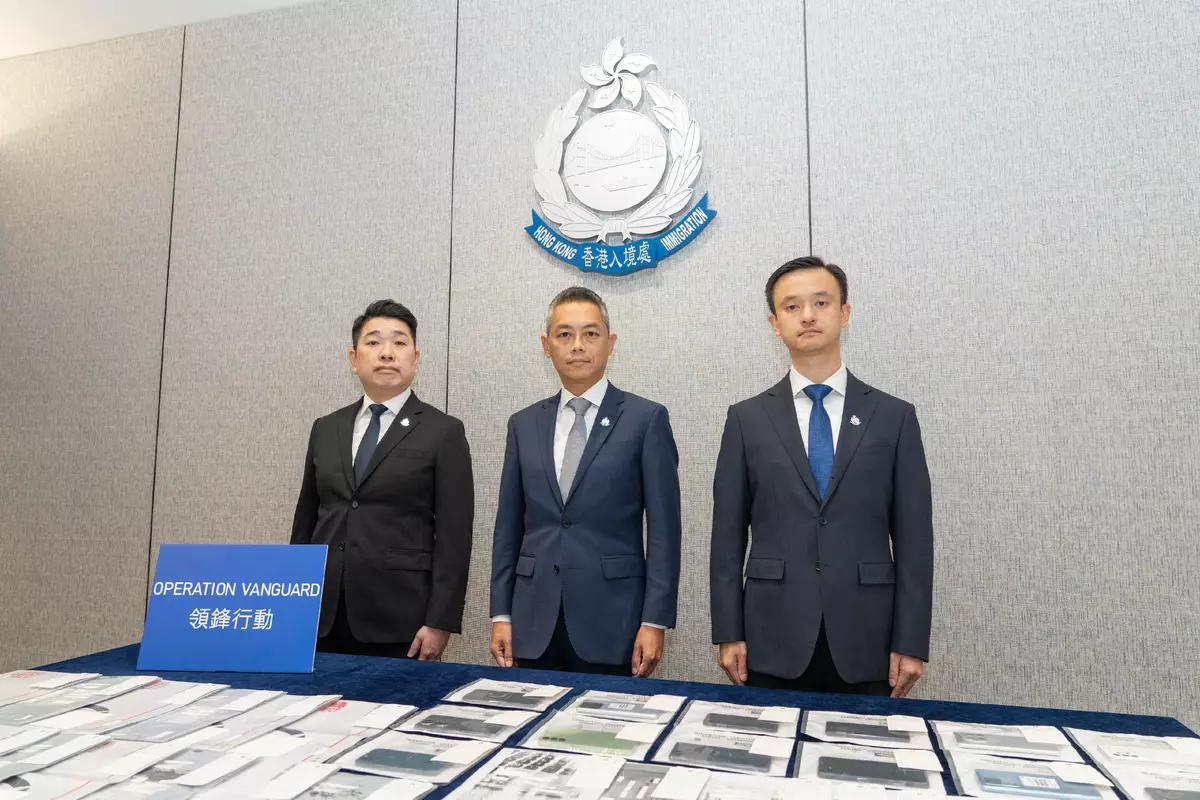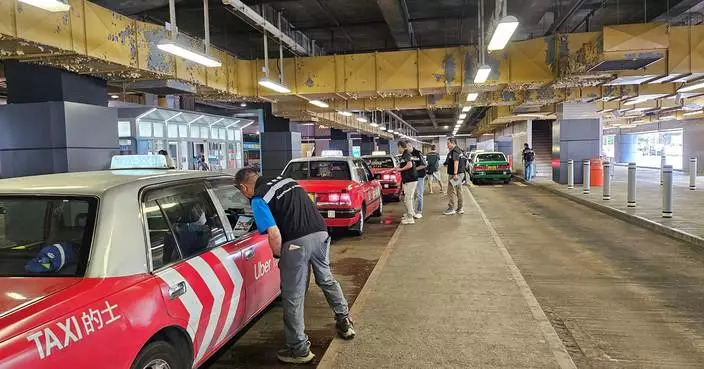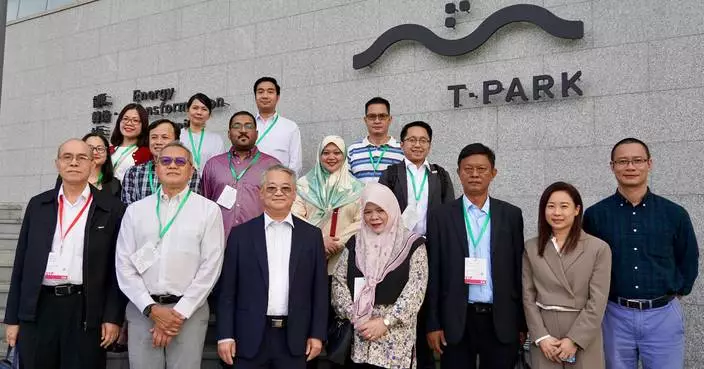Cross-boundary forgery syndicate smashed by Immigration Department and Mainland authorities
The Immigration Department (ImmD) mounted a cross-boundary joint operation with Guangxi Public Security Department, Guangdong Provincial Public Security Department and Shenzhen Frontier Inspection Station in July and August under the co-ordination of the Exit and Entry Administration of the People's Republic of China. The operation successfully neutralised a cross-boundary forgery syndicate, resulting in the arrest of a total of 201 persons and the seizure of a large amount of forgery equipment and forged documents.
In May this year, Mainland authorities unearthed crucial intelligence related to a syndicate arranging Mainlanders to take up illegal employment in Hong Kong. The ImmD immediately collaborated with the Mainland authorities to conduct in-depth investigations and successfully identified a cross-boundary forgery syndicate specialised in recruiting Mainlanders to take up illegal employment in Hong Kong and providing them with accommodation and forged Hong Kong identity cards to seek illegal employments. The forgery syndicate had set up workshops on the Mainland for producing forged documents, and they would dispatch the forged Hong Kong identity cards by express delivery to Hong Kong syndicate members, who would then distribute the forged Hong Kong identity cards to the illegal workers.
The ImmD swiftly launched an operation codenamed "Vanguard" to eradicate the syndicate in Hong Kong. During the operation, ImmD investigators retrieved a batch of suspicious parcels sent out from Mainland forgery workshops and disguised as couriers to deliver the suspicious parcels. As a result, several Hong Kong syndicate members were apprehended, and a number of forged Hong Kong identity cards were seized. Moreover, the ImmD raided a total of 69 premises, including 37 residential premises and 32 working places, and arrested a total of 97 persons, including a syndicate mastermind, nine syndicate members, 67 suspected illegal workers and 20 suspected employers, aged 18 to 64. Ten syndicate members, including the mastermind, comprise five men and five women, consisting of three Hong Kong residents and seven Mainlanders, aged 18 to 61. The 67 arrested suspected illegal workers comprise 34 men and 33 women, including 65 Mainlanders, one Indonesian and one Vietnamese Recognizance Form holder issued by the ImmD, aged 22 to 64. ImmD investigators also seized 21 forged Hong Kong identity cards, 18 copies of forged Hong Kong identity cards and two forged documents related to construction workers. Through this large-scale cross-boundary joint operation, the cross-boundary forgery syndicate has been neutralised. The investigation is still ongoing, and more persons involved in the case may be arrested.
On the Mainland side, three forgery workshops were smashed and a total of 104 offenders were arrested, including 18 syndicate masterminds and ring members, and 12 pieces of forgery equipment were seized.
An ImmD spokesman said, "Under the laws of Hong Kong, anyone who uses or possesses a forged identity card commits an offence. Offenders are liable to prosecution and, upon conviction, a maximum penalty of a fine of $100,000 and 10 years' imprisonment. Any person who without lawful authority or reasonable excuse transfers to another person a Hong Kong identity card commits an offence. Offenders are liable to prosecution and, upon conviction, a maximum penalty of a fine of $100,000 and 10 years' imprisonment."
The spokesman warned, "Any person who contravenes a condition of stay in force in respect of him or her shall be guilty of an offence. Also, visitors are not allowed to take employment in Hong Kong, whether paid or unpaid, without the permission of the Director of Immigration. Offenders are liable to prosecution and upon conviction face a maximum fine of $50,000 and up to two years' imprisonment. Aiders and abettors are also liable to prosecution and penalties. As stipulated in section 38AA of the Immigration Ordinance, an illegal immigrant, a person who is the subject of a removal order or a deportation order, an overstayer or a person who was refused permission to land is prohibited from taking any employment, whether paid or unpaid, or establishing or joining in any business. Offenders are liable upon conviction to a maximum fine of $50,000 and up to three years' imprisonment."
The spokesman reiterated that it is a serious offence to employ people who are not lawfully employable. Under the Immigration Ordinance, the maximum penalty for an employer employing a person who is not lawfully employable, i.e. an illegal immigrant, a person who is the subject of a removal order or a deportation order, an overstayer or a person who was refused permission to land, has been significantly increased from a fine of $350,000 and three years' imprisonment to a fine of $500,000 and 10 years' imprisonment to reflect the gravity of such offences. The director, manager, secretary, partner, etc, of the company concerned may also bear criminal liability. The High Court has laid down sentencing guidelines that the employer of an illegal worker should be given an immediate custodial sentence.
According to the court sentencing, employers must take all practicable steps to determine whether a person is lawfully employable prior to employment. Apart from inspecting a prospective employee's identity card, the employer has the explicit duty to make enquiries regarding the person and ensure that the answers would not cast any reasonable doubt concerning the lawful employability of the person. The court will not accept failure to do so as a defence in proceedings. It is also an offence if an employer fails to inspect the job seeker's valid travel document if the job seeker does not have a Hong Kong permanent identity card. Offenders are liable upon conviction to a maximum fine of $150,000 and to imprisonment for one year. In that connection, the spokesman would like to remind all employers not to defy the law by employing illegal workers. The ImmD will continue to take resolute enforcement action to combat such offences.
Under the existing mechanism, the ImmD will, as a standard procedure, conduct an initial screening of vulnerable persons, including illegal workers, illegal immigrants, sex workers and foreign domestic helpers, who are arrested during any operation with a view to ascertaining whether they are trafficking in persons (TIP) victims. When any TIP indicator is revealed in the initial screening, the ImmD officers will conduct a full debriefing and identification by using a standardised checklist to ascertain the presence of TIP elements, such as threats and coercion in the recruitment phase and the nature of exploitation. Identified TIP victims will be provided with various forms of support and assistance, including urgent intervention, medical services, counselling, shelter or temporary accommodation and other supporting services. The ImmD calls on TIP victims to report crimes to the relevant departments immediately.

Cross-boundary forgery syndicate smashed by Immigration Department and Mainland authorities Source: HKSAR Government Press Releases

Cross-boundary forgery syndicate smashed by Immigration Department and Mainland authorities Source: HKSAR Government Press Releases









